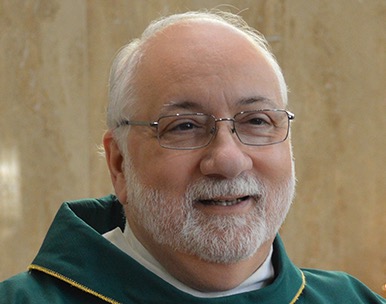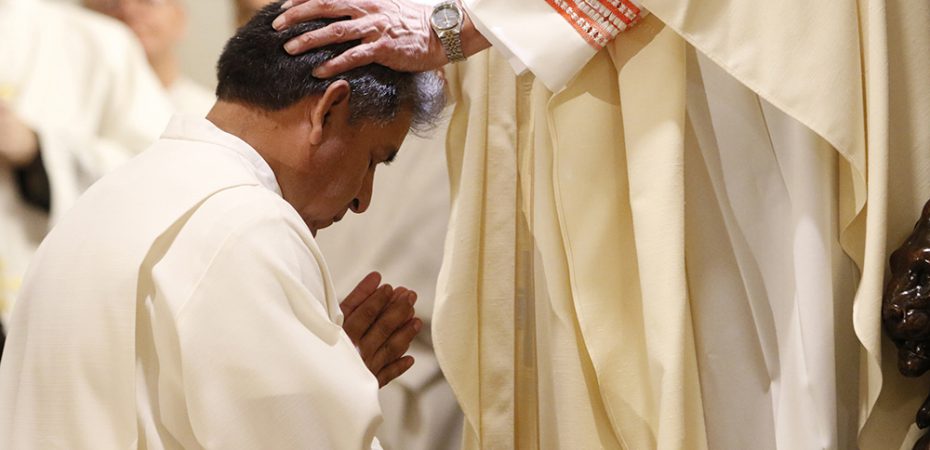Intentionality and the Diaconate
Speaking to the deacon’s relationship to, identity in and mission with Christ the Servant
Deacon Dominic Cerrato Comments Off on Intentionality and the Diaconate
 It’s often the case that, when I ask a newly ordained deacon what makes his ministry “diaconal,” he replies, “Service.” When I ask how that service differs from the service of a layperson engaged in full-time Church ministry, I typically get the response, “Ordained service.” This form of circular reasoning really doesn’t answer the question and begs another more essential one, “Can a deacon who doesn’t see his ministry as intentionally diaconal, be an effective deacon?” In other words, if the deacon does not grasp the meaning of his diaconate as it pertains to his relationship to, identity in and mission with Christ the Servant, how, in the exercise of his ministry, is it possible to bear witness to that same Christ? Absent these deep and abiding elements consisting of relationship, identity and mission, the deacon is reduced to a glorified social worker. This is because these elements enable the deacon to source his ministry in Christ the Servant and, in doing so, make Our Lord present to a world in desperate need of his saving love.
It’s often the case that, when I ask a newly ordained deacon what makes his ministry “diaconal,” he replies, “Service.” When I ask how that service differs from the service of a layperson engaged in full-time Church ministry, I typically get the response, “Ordained service.” This form of circular reasoning really doesn’t answer the question and begs another more essential one, “Can a deacon who doesn’t see his ministry as intentionally diaconal, be an effective deacon?” In other words, if the deacon does not grasp the meaning of his diaconate as it pertains to his relationship to, identity in and mission with Christ the Servant, how, in the exercise of his ministry, is it possible to bear witness to that same Christ? Absent these deep and abiding elements consisting of relationship, identity and mission, the deacon is reduced to a glorified social worker. This is because these elements enable the deacon to source his ministry in Christ the Servant and, in doing so, make Our Lord present to a world in desperate need of his saving love.
If all this talk about intentionality sounds a bit abstract, think about it in terms of the vocation of fatherhood. Here I’m not referring to fathering in the biological sense, or even in the common sense of raising children, but rather as these relate to the father’s faith in Jesus Christ. If a man who makes the claim of being a Christian father doesn’t grasp what this means as it pertains to his relationship to, identity in and mission with God the Father, how, in the living out of his fatherhood, is it possible to bear witness to that same God to his children? Absent these deep and abiding elements of relationship, identity and mission, his fatherhood is reduced to that of a nonbeliever with nothing distinctively Christian about it. Just as intentionality is essential in fatherhood, it’s equally essential in the diaconate. Both are, in their most basic sense, a particular kind of participation in the life of God.
Relationship, identity and mission, whether about fatherhood or the diaconate, are critical to intentionality. Grounding these three elements in intimate union with Christ the Servant to whom we were configured on the day of our ordination makes diaconal ministry distinctively diaconal. This is because the diaconate finds its definitive meaning in bearing witness to Christ the Servant to the whole of the Church and indeed to the whole of the world. It’s this witness, deeply rooted in the Paschal Mystery, that makes the deacon’s contribution to the mystery of salvation and the redemption of the world uniquely diaconal.
One of the ways this intentionality plays out is in the selection of articles for The Deacon. Because the magazine is dedicated to the diaconate, its content has a very specific focus. Consequently, we only print those submissions that speak of the deacon’s relationship to, identity in and mission with Christ the Servant. As noted above, this focus on Christ the Servant gives the diaconate its distinctive contribution to the life of the Church and, because of this, is the only content suitable for publication. In this regard, it’s not enough for a deacon to submit an article describing his ministry. He must submit it describing how his own diaconate, his own understanding of Christ the Servant, is expressed in that ministry. Put another way, it’s not about the deacon’s ministry as much as how that ministry is specifically diaconal.
This insistence on intentionality means that The Deacon, as a publication dedicated to the diaconate, seeks to strengthen those called by God to sacred ecclesial service with sound content that deepens their relationship to, identity in and mission with Christ the Servant. In this way, the magazine contributes to the strengthening of the diaconate and through that the mission of the Church.
DEACON DOMINIC CERRATO, Ph.D., is editor of The Deacon and director of diaconal formation for the Diocese of Joliet, Illinois. He is the founder of Diaconal Ministries, where he gives national presentations and retreats to deacons and diaconal candidates. Follow him on Facebook to continue the conversation.





